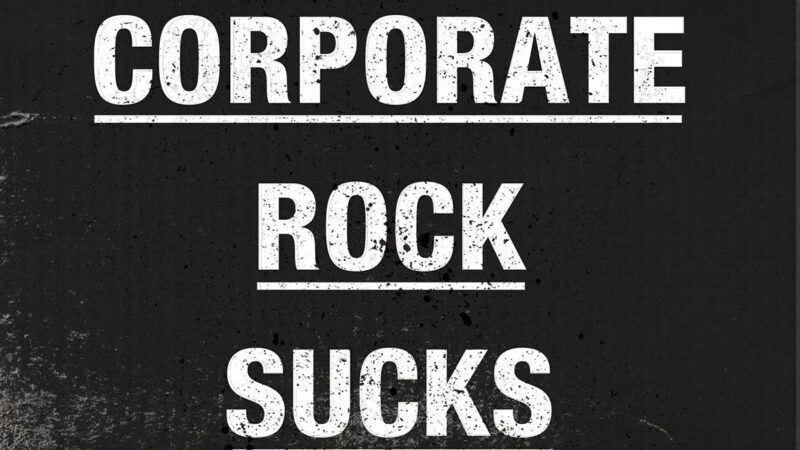Review: Corporate Rock Sucks Covers the Slow Decline of Punk's Most Important Label
Perhaps boutique businesses with hip tastes can be as bad for bands as the biggest corporation.

Early punk musicians almost universally relied on entrepreneurs, however seat-of-their-pants and undercapitalized, to manufacture and distribute their recordings. For bands with the kind of uncompromising aesthetic that made big entertainment corporations nervous, fellow travelers willing to run labels were important. In America, none were more important than SST Records, home at times to Sonic Youth, Dinosaur Jr, the Meat Puppets, and Hüsker Dü.
The story of that label and its founder Greg Ginn, guitarist for the legendary hardcore act Black Flag, is told in Jim Ruland's Corporate Rock Sucks. The lure of corporate cash is hard to resist—even after launching his own SST, Ginn made (and quickly regretted) a deal with an MCA-owned label that prevented him from using his own band's name on albums for a time.
Eventually, Ginn's own unwillingness to pay royalties reliably (and actions like suing the SST act Negativland, for, as The Village Voice put it, "printing his threat to sue the band") brought about the long, slow, depressing decline of his label's reputation and market power. Perhaps boutique businesses with hip tastes can be as bad for bands as the biggest corporation.
Editor's Note: As of February 29, 2024, commenting privileges on reason.com posts are limited to Reason Plus subscribers. Past commenters are grandfathered in for a temporary period. Subscribe here to preserve your ability to comment. Your Reason Plus subscription also gives you an ad-free version of reason.com, along with full access to the digital edition and archives of Reason magazine. We request that comments be civil and on-topic. We do not moderate or assume any responsibility for comments, which are owned by the readers who post them. Comments do not represent the views of reason.com or Reason Foundation. We reserve the right to delete any comment and ban commenters for any reason at any time. Comments may only be edited within 5 minutes of posting. Report abuses.
Please to post comments


Brings to mind that old adage, "Those that can, do. Those that can't, teach. Those that can't teach, coach." Update it to "Those that can, play. Those that can't, manage. Those that can't manage, produce."
Not much familiar with the punk scene even if I like some of the music and recognize a couple of names. But my experience has always been that people who jump into the management and corporate side of artistry were on the verge of burning out anyway, and after the jump, their musical tastes freeze and they resent newcomers doing things differently. "No you're doing it wrong, let me show you the right way."
Punk was never as distant from corporate rock as the posing let on.
One of the Sex Pistols producers was Chris Thomas, who recorded some of the tracks on the Beatles' "White Album" while George Martin was on holiday.
The Ramones were eventually produced by Phil Spector. You can't get more mainstream than that.
Nick Mason of Pink Floyd produced several early and important punk records. Punk was always phony. The last thing Johnny Rotten said on stage at the last Sex Pistols concert in San Francisco was "you ever get the feeling you have been cheated?". He wasn't talking about the audience. He was talking about himself. He believed in all the punk bullshit only to find out no one else, least of all his management and record company did. They just made the Sex Pistols into a commercialized circus act to make money.
Well, that is sad if he didn't realize he was making music just as commercial as Crosby, Stills and Nash or whoever (fill in your own classic rock name).
“Rock and roll high school” is soooo hardcore.
The ramones sucked.
When someone says 'early punk' and then mentions Sonic Youth, Husker Du. the Meat Puppets and Dinosaur Jr, one is letting all reading know that the person writing knows neither what 'early' or 'punk' mean.
exactly lol. coincidentally wearing my DK shirt today